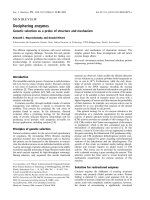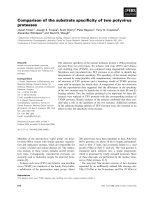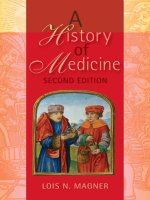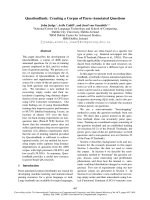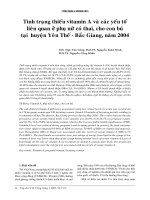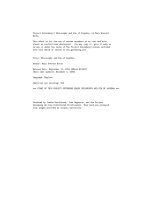Hygeia, a City of Health, by Benjamin Ward Richardson This eBook give it away or re-use it under the terms of the Project Gutenb doc
Bạn đang xem bản rút gọn của tài liệu. Xem và tải ngay bản đầy đủ của tài liệu tại đây (345.36 KB, 116 trang )
Project Gutenberg's Hygeia, a City of
Health, by Benjamin Ward Richardson
This eBook is for the use of anyone
anywhere at no cost and with
almost no restrictions whatsoever. You
may copy it, give it away or
re-use it under the terms of the Project
Gutenberg License included
with this eBook or online at
www.gutenberg.net
Title: Hygeia, a City of Health
Author: Benjamin Ward Richardson
Release Date: April 15, 2004 [EBook
#12036]
Language: English
*** START OF THIS PROJECT GUTENBERG
EBOOK HYGEIA, A CITY OF HEALTH ***
Produced by Paul Murray, Sam and the
Online Distributed Proofreading
Team.
This file was produced from images
generously made available by the
Bibliothèque nationale de France
(BnF/Gallica) at
HYGEIA
A CITY OF HEALTH
BY
BENJAMIN WARD
RICHARDSON M.D.,
F.R.S.
1876
TO EDWIN CHADWICK, C.B.
MY DEAR MR. CHADWICK,
I wrote this Address with the intention
of dedicating it to you, as a simple but
hearty acknowledgment by a sanitary
student, himself well ripened in the
work, of your pre-eminent position as
the living leader of the sanitary
reformation of this century.
The favour the Address has received
indicates notably two facts: the
advance of public opinion on the
subject of public health, and the
remarkable value and influence of your
services as the sanitary statesman by
whom that opinion has been so wisely
formed and directed.
In this sense of my respect for you, and
of my gratitude, pray accept this
trifling recognition, and believe me to
be,
Ever faithfully yours,
B.W. RICHARDSON.
PREFATORY NOTE.
The immediate success of this Address
caused me to lay it aside for some
months, to see if the favour with which it
was received would remain. I am
satisfied to find that the good fortune
which originally attended the effort
holds on, and that in publishing it now in
a separate form I am acting in obedience
to a generally expressed desire.
Since the delivery of the Address before
the Health Department of the Social
Science Congress, over which I had the
honour to preside, at Brighton, in
October last, every day has brought
some new suggestion bearing on the
subjects discussed, and the temptation
has been great to add new matter, or
even to recast the essay and bring it out
as a more compendious work. On
reflection I prefer to let it take its place
in literature, in the first instance, in its
original and simple dress.
12 HINDE STREET, W.: August 18,
1876.
HYGEIA, A CITY OF
HEALTH
We meet in this Assembly, a voluntary
Parliament of men and women, to study
together and to exchange knowledge and
thought on works of every-day life and
usefulness. Our object, to make the
present existence better and happier; to
inquire, in this particular section of our
Congress:—What are the conditions
which lead to the pain and penalty of
disease; what the means for the removal
of those conditions when they are
discovered? What are the most ready
and convincing methods of making
known to the uninformed the facts: that
many of the conditions are under our
control; that neither mental serenity nor
mental development can exist with an
unhealthy animal organisation; that
poverty is the shadow of disease, and
wealth the shadow of health?
These objects relate to ourselves, to our
own reliefs from suffering, to our own
happiness, to our own riches. We have, I
trust and believe, yet another object, one
that relates not to ourselves, but to those
who have yet to be; those to whom we
may become known, but whom we can
never know, who are the ourselves,
unseen to ourselves, continuing our
mission.
We are privileged more than any who
have as yet lived on this planet in being
able to foresee, and in some measure
estimate, the results of our wealth of
labour as it may be possibly extended
over and through the unborn. A few
scholars of the past, like him who,
writing to the close of his mortal day,
sang himself to his immortal rest with
the 'Gloria in excelsis,' a few scholars
might foresee, even as that Baeda did,
that their living actual work was but the
beginning of their triumphant course
through the ages,—the momentum. But
the masses of the nations, crude and
selfish, have had no such prescience, no
such intent. 'Let us eat and drink, for to-
morrow we die!' That has been the pass,
if not the password, with them and
theirs.
We, scholars of modern thought, have
the broader, and therefore more solemn
and obligatory knowledge, that however
many to-morrows may come, and
whatever fate they may bring, we never
die; that, strictly speaking, no one yet
who has lived has ever died; that for
good or for evil our every change from
potentiality into motion is carried on
beyond our own apparent transitoriness;
that we are the waves of the ocean of
life, communicating motion to the
expanse before us, and leaving the
history we have made on the shore
behind.
Thus we are led to feel this greater
object: that to whatever extent we, by
our exertions, confer benefits on those
who live, we extend the advantage to
those who have to live; that one good
thought leading to practical useful action
from one man or woman, may go to the
virtue of thousands of generations; that
one breath of health wafted by our breath
may, in the aggregate of life saved by it,
represent in its ultimate effect all the life
that now is or has been.
At the close of a Parliamentary session,
an uneventful leader of a section of
Parliament banters his more eventful
rival, and enlivening his criticism by a
sneer at our Congress, challenges the
contempt of his rival, as if to draw it
forth in the same critical direction. Alas!
it is too true that great congresses, like
great men, and even like Parliaments, do
live sometimes for many years and talk
much, and seem to miss much and
advance little; so that in what relates to
the mere present it were wrong,
possibly, to challenge the sally of the
statesman who, from his own helpless
height, looked down on our weakness.
But inasmuch as no man knoweth the end
of the spoken word, as that which is
spoken to-day, earnestly and simply,
may not reappear for years, and may then
appear with force and quality of hidden
virtue, there is reason for our uniting
together beyond the proof of necessity
which is given in the fact of our
existence. Perchance some day our
natural learning, gathered in our varied
walks of life, and submitted in open
council, may survive even Parliamentary
strife; perchance our resolutions, though
no sign-manual immediately grace them,
are the informal bills which ministers
and oppositions shall one day discuss,
Parliaments pass, royal hands sign, and
the fixed administrators of the will of the
nation duly administer.
These thoughts on the future, rather than
on the passing influence of our
congressional work, have led me to the
simple design of the address which, as
President of this Section, I venture to
submit to you to-day. It is my object to
put forward a theoretical outline of a
community so circumstanced and so
maintained by the exercise of its own
freewill,
guided
by
scientific
knowledge, that in it the perfection of
sanitary results will be approached, if
not actually realised, in the co-existence
of the lowest possible general mortality
with the highest possible individual
longevity. I shall try to show a working
community in which death,—if I may
apply so common and expressive a
phrase on so solemn a subject,—is kept
as nearly as possible in its proper or
natural place in the scheme of life.
HEALTH AND
CIVILISATION.
Before I proceed to this task, it is right I
should ask of the past what hope there is
of any such advancement of human
progress. For, as my Lord of Verulam
quaintly teaches, 'the past ever deserves
that men should stand upon it for awhile
to see which way they should go, but
when they have made up their minds they
should hesitate no longer, but proceed
with cheerfulness,' For a moment, then,
we will stand on the past.
From this vantage-ground we gather the
fact, that onward with the simple
progress of true civilisation the value of
life has increased. Ere yet the words
'Sanitary Science' had been written; ere
yet the heralds of that science (some of
whom, in the persons of our illustrious
colleagues, Edwin Chadwick and
William Fair, are with us in this place at
this moment), ere yet these heralds had
summoned the world to answer for its
profligacy of life, the health and strength
of
mankind
was
undergoing
improvement. One or two striking facts
must be sufficient in the brief space at
my disposal to demonstrate this truth. In
England, from 1790 to 1810, Heberden
calculated that the general mortality
diminished one-fourth. In France, during
the same period, the same favourable
returns were made. The deaths in
France, Berard calculated, were 1 in 30
in the year 1780, and during the eight
years, from 1817 to 1828, 1 in 40, or a
fourth less. In 1780, out of 100 new-born
infants, in France, 50 died in the two
first years; in the later period, extending
from the time of the census that was
taken in 1817 to 1827, only 38 of the
same age died, an augmentation of infant
life equal to 25 per cent. In 1780 as
many as 55 per cent. died before
reaching the age of ten years; in the later
period 43, or about a fifth less. In 1780
only 21 persons per cent. attained the
age of 50 years; in the later period 32, or
eleven more, reached that term. In 1780
but 15 persons per cent, arrived at 60
years; in the later period 24 arrived at
that age.
Side by side with these facts of the
statist we detect other facts which show
that in the progress of civilisation the
actual organic strength and build of the
man and woman increases. As in the
highest developments of the fine arts the
sculptor and painter place before us the
finest imaginative types of strength,
grace, and beauty, so the silent artist,
civilisation, approaches nearer and
nearer to perfection, and by evolution of
form and mind developes what is
practically a new order of physical and
mental build. Peron,—who first used, if
he did not invent, the little instrument,
the dynamometer, or muscular-strength
measurer,—subjected
persons
of
different stages of civilisation to the test
of his gauge, and discovered that the
strength of the limbs of the natives of
Van Diemen's Land and New Holland
was as 50 degrees of power, while that
of the Frenchmen was 69, and of the
Englishmen 71. The same order of facts
are maintained in respect to the size of
body. The stalwart Englishman of to-day
can neither get into the armour nor be
placed in the sarcophagus of those sons
of men who were accounted the heroes
of the infantile life of the human world.
We discover, moreover, from our view
of the past, that the developments of
tenacity of life and of vital power have
been comparatively rapid in their course
when they have once commenced. There
is nothing discoverable to us that would
lead to the conception of a human
civilisation extending back over two
hundred generations; and when in these
generations we survey the actual effect
of civilisation, so fragmentary and
overshadowed by persistent barbarism,
in influencing disease and mortality, we
are reduced to the observation of at most
twelve generations, including our own,
engaged, indirectly or directly, in the
work of sanitary progress. During this
comparatively brief period, the labour of
which, until within a century, has had no
systematic direction, the changes for
good that have been effected are amongst
the most startling of historical facts.
Pestilences
which
decimated
populations, and which, like the great
plague of London, destroyed 7,165
people in a single week, have lost their
virulency; gaol fever has disappeared,
and our gaols, once each a plague-spot,
have become, by a strange perversion of
civilisation, the health spots of, at least,
one kingdom. The term, Black Death, is
heard no more; and ague, from which the
London physician once made a fortune,
is now a rare tax even on the skill of the
hardworked Union Medical Officer.
From the study of the past we are
warranted, then, in assuming that
civilisation,
unaided
by special
scientific knowledge, reduces disease
and lessens mortality, and that the hope
of doing still more by systematic
scientific art is fully justified.
I might hereupon proceed to my project
straightway. I perceive, however, that it
may be urged, that as mere civilising
influences can of themselves effect so
much, they might safely be left to
themselves to complete, through the
necessity of their demands, the whole
sanitary code. If this were so, a formula
for a city of health were practically
useless. The city would come without
the special call for it.
I think it probable the city would come
in the manner described, but how long it
would be coming is hard to say, for


